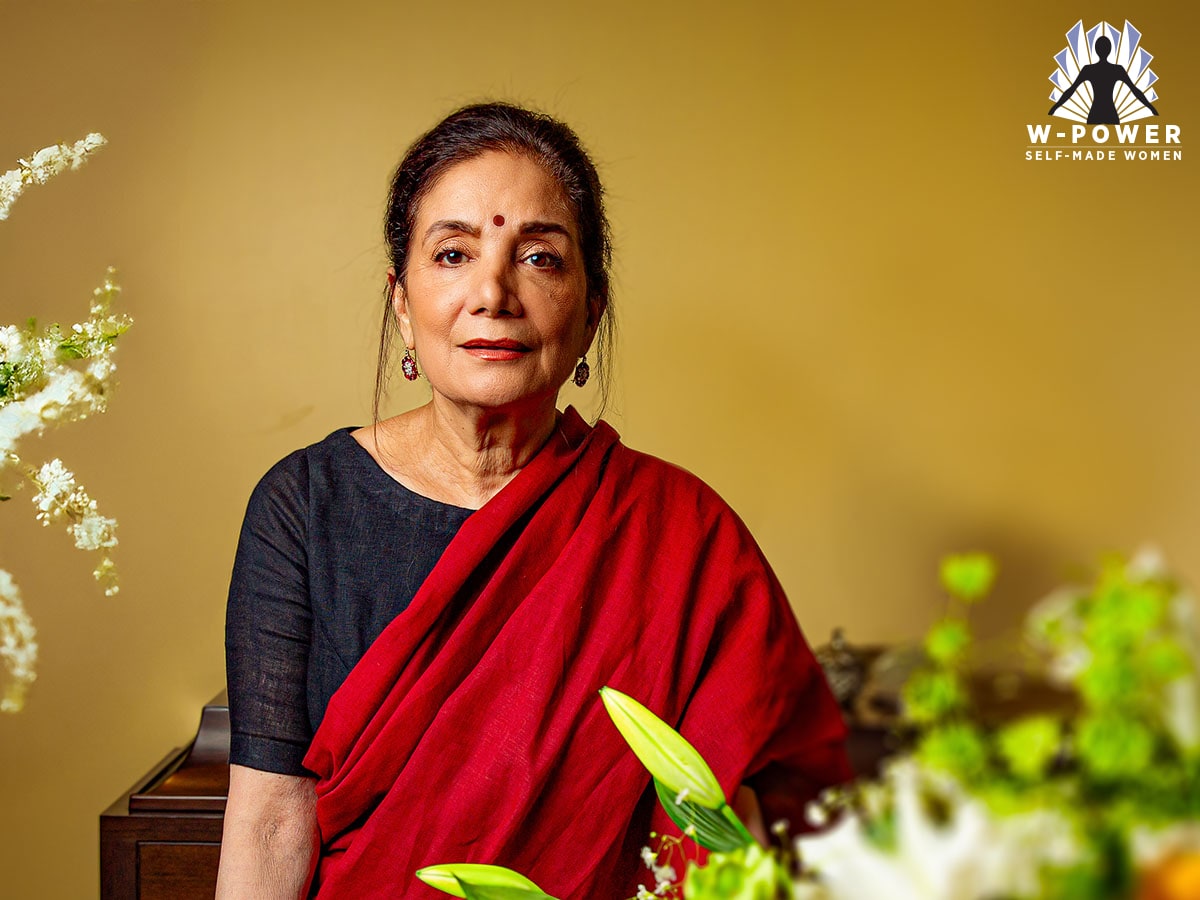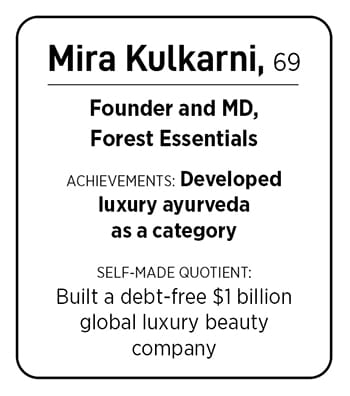 Mira Kulkarni, Founder and managing director of Forest Essentials Image:Madhu Kapparath; Imaging: Kapil Kashyap
Mira Kulkarni, Founder and managing director of Forest Essentials Image:Madhu Kapparath; Imaging: Kapil Kashyap
Mira Kulkarni, 69, founder and managing director of Forest Essentials, converted her passion for crafting pure ayurvedic skin and haircare products into a debt-free $1 billion luxury beauty company. Having carved a strong niche in India’s rapidly growing beauty and personal care industry, Kulkarni wants to conquer international markets: “Going global and making an Indian brand comparable in its category to any of the best brands in the world is the next goal.”
In her mid-40s, Kulkarni started the business out of her home with an investment of ₹2 lakh and two employees, in 2000. “We made money and put it back in the business. This was a slower way of growth but there was no goal to get to and there was no need to get any funding,” she explains. “I had no business sense at all.”
 What Kulkarni initially lacked in terms of financial acumen she made up with hard work, passion and an astute understanding of the needs of customers. She was quick to identify the gap in the market. “The ayurvedic products available in the market were largely substandard and mostly medicinal,” she recalls. “It was a revolutionary idea to have a luxury ayurvedic product.”
What Kulkarni initially lacked in terms of financial acumen she made up with hard work, passion and an astute understanding of the needs of customers. She was quick to identify the gap in the market. “The ayurvedic products available in the market were largely substandard and mostly medicinal,” she recalls. “It was a revolutionary idea to have a luxury ayurvedic product.”
Amitabh Kant, former CEO of the Niti Aayog, believes Forest Essentials is an example of how India can take its rich ancient heritage and give it a unique contemporary blend and experience. “India needs to cultivate more such brands—rooted in heritage yet globally relevant—to truly establish itself as a powerhouse in premium markets,” he opines. Leading fashion designer Sabyasachi Mukherjee agrees, “Forest Essentials truly captures the spirit of Indian beauty both through product and storytelling.”
Click here for the full list
Kulkarni wanted to blend the purity and efficacy of ayurveda with luxurious formulations that were easy to use. “We focussed on innovation, textures and fragrance,” she adds. “We were the first company to identify this and there was a segment in the market that didn’t exist before we came in,” she claims. In the first seven to 10 years, Forest Essentials did not spend money on marketing or advertising and relied on word-of-mouth publicity to establish its credibility.
Forest Essentials gradually expanded its range of products and forayed into supplying hotel amenities at luxury hotels and spas. However, a serendipitous meeting with Leonard Lauder, chairman, Estee Lauder, during his visit to India to attend the wedding of Elizabeth Hurley and Indian business tycoon Arun Nayar at a palace in Jodhpur in 2007, marked a major turning point in Kulkarni’s entrepreneurial journey.
“He got a gift of some of our products from Lady Lynn Forester de Rothschild and he was intrigued,” Kulkarni recounts. “He asked his country manager to find out more about our company.” Soon a meeting was scheduled in Delhi. “We chatted and a 30-minute meeting went on for 2 hours,” she adds. “We discussed how his mother had started Estee Lauder and we found that our story was similar.”
Also read: Renuka Ramnath: The value creator
A couple of months later, Estee Lauder invested an undisclosed amount in Forest Essentials. “We did not fully realise the larger implications at that time. It was not the money, which was, shall I say, minimal, but we wanted to have this aspirational beauty brand on the table to help take Forest Essentials global,” Kulkarni says.
The global cosmetics giant is not involved in the day-to-day operations of Forest Essentials. The management has two board meetings each year to discuss long-term strategy and global expansion plans. “We have learnt some invaluable things from them, such as incorporating the highest standards of quality control in our manufacturing processes,” Kulkarni shares.

Known for her “extreme fixation on quality”, Kulkarni has earned goodwill as one of the pioneers of luxury ayurveda. The emergence of VC-backed new-age beauty companies has put the spotlight on what it takes to build a credible brand—that stands out from the clutter—in times of unsustainable beauty fads, steep discounts and copycats. Kulkarni agrees that this is a challenge. “I’m amazed to suddenly see these 30,000 brands… where have they come from… and they all look like clones of each other,” she says.
Despite rampant predatory pricing and marketing exuberance at play in the industry, Kulkarni is steadfast about not going down that road to grow the business. “Going digital has been a strategy in recent years to reach a wider audience,” she says. “Here the whole discounted game comes into play, and this is something that I am not personally comfortable with,” she adds. “A company that offers 70 percent discount all the time has eroded the brand completely whether they have made money or not.”
(This story appears in the 18 April, 2025 issue
of Forbes India. To visit our Archives, click here.)
 Mira Kulkarni, Founder and managing director of Forest Essentials Image:Madhu Kapparath; Imaging: Kapil Kashyap
Mira Kulkarni, Founder and managing director of Forest Essentials Image:Madhu Kapparath; Imaging: Kapil Kashyap  What Kulkarni initially lacked in terms of financial acumen she made up with hard work, passion and an astute understanding of the needs of customers. She was quick to identify the gap in the market. “The ayurvedic products available in the market were largely substandard and mostly medicinal,” she recalls. “It was a revolutionary idea to have a luxury ayurvedic product.”
What Kulkarni initially lacked in terms of financial acumen she made up with hard work, passion and an astute understanding of the needs of customers. She was quick to identify the gap in the market. “The ayurvedic products available in the market were largely substandard and mostly medicinal,” she recalls. “It was a revolutionary idea to have a luxury ayurvedic product.”
